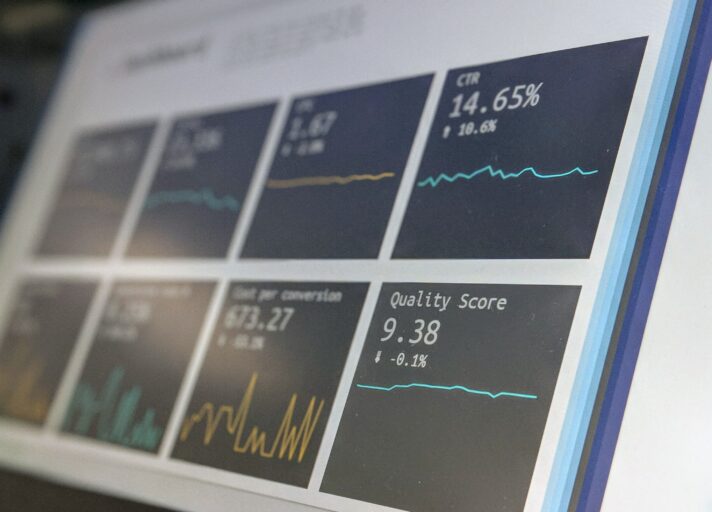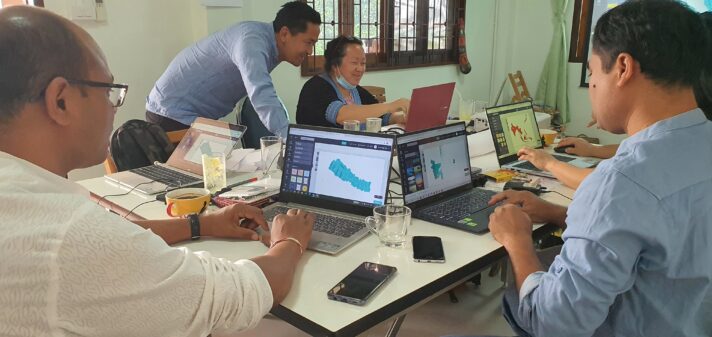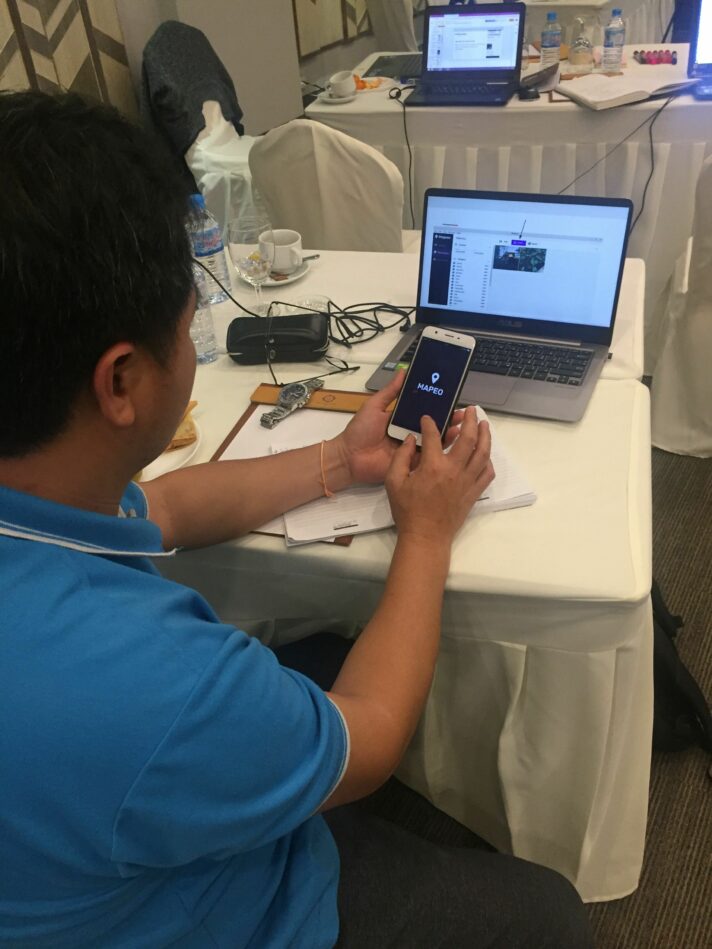If data were an open forest – would anyone use it?
Data and information drive decision making that affects everyday life; and in this day and age, data plays an increasingly crucial role in innovation and policy transformation. Its abundance is increasing yet our ability to harness and utilise this data equitably has not. Although the use of data has been increasing within government and private sectors, it is considerably low in civil society and development work, particularly in the Mekong region.

Photo by Stephen Dawson on Unsplash
The Open Development Initiative (ODI) has been facilitating the collation and release of data and information for over eleven years now. The demand and need to provide data for our civil society constituents is summarized through a threefold process below:
The Why
Firstly, governments within the Mekong are marred with weak governance overall and therefore suffer from a lack of political will to release data and information deemed to be in public interest. Even if they want to release the data, institutional capacities are generally low and many departments have little to no resources to do so. This creates an environment of data scarcity and secrecy where data is often either entirely unavailable or if available, guarded as a means of power. If data is available, it is difficult to find and often inaccessible for most people.
The What
This brings us to the creation of the Open Development Mekong (ODM) platform and our second point; making the data openly available and accessible to all people does not necessarily mean that people will use it. Once the data is found, cleaned, made available and put upon the platform in open data formats, who can access this data? How do civil society and other intermediaries utilise this data for their own purposes and to further their advocacy? The ODM signatory approach relies on impartial presentation of data, using open data standards alongside objective analysis through visualisations, briefings, maps, and other data products to increase transparency and accessibility. Our platform natively supports crowdsourcing data and facilitates multi-sectoral and transborder views as well as respecting data rights where applicable to respect the people of whose data we are sharing.
Setting up the infrastructure to facilitate the platform was a collaborative effort and continues to be a work in progress. Open data standards outline the framework for our approach and allow us to publish and re-share data that other development partners and institutions would not be able to release. Despite the overall shift in the power of data sharing, some organizations still have reservations about sharing the data openly. Collaborations among other research institutes, think tanks, etc., are an opportunity enabling diverse partnerships to develop strategic coalitions through the sharing of data. It is about creating a data ecosystem that facilitates data sharing and promotes an environment where data secrecy cannot survive.
This has fundamentally made ODM an invaluable platform for open data and information sharing within the Mekong and has facilitated a number of partnerships that ensure continued flows of data, with reliability and frequent updates. Yet as our focus was on releasing data and information for use and also ensuring protections and privacy of our users, it was near impossible to ascertain who was using the platform and for what purpose.
The How
Ultimately through a series of facilitated discussions and research, it was clear that the capacity for civil society in the Mekong to consume and utilise data was low, and in many disconnected communities was non-existent. Users of our platform appreciated the thematic pieces we produced; however, they were not using the ‘data’ themselves. Third and lastly, the ODI’s investment in data literacy initiatives is driven by this gap in capacities. We want to accelerate civil society capabilities and readiness to utilise data and information for effective advocacy using data-driven approaches. Our data literacy training has adopted the World Bank Certificate Program piloted in Myanmar, where we saw intensive hands-on training over several weeks, using mentoring techniques that specifically targeted our audience was most effective. The commencement of this programming in 2019, catalysed a 3-month data literacy programme for journalists in Myanmar, which subsequently led to localized training in Cambodia, Thailand, Vietnam and Laos respectively. Each application of the training was tailored to meet the needs of various sectors; such as journalism, forestry, education, women’s networks, indigenous peoples and vulnerable groups, etc. We specifically targeted underrepresented and marginalised groups during our training and ensured gender balance as well as offered women only courses.

2021 Data Literacy Training for Indigenous Peoples Network in Chiang Mai, Thailand by Open Development Thailand
After two years of implementing the programme, even during the COVID-19 pandemic, the cumulation of the lessons learnt were presented as well as the data literacy experiences reflected by stakeholders during an online event. We engaged training alumni and data storytelling contest winners as well as civil society representatives from the lower Mekong countries to present their challenges, opportunities and how they apply their skills in their advocacy works.
What have we learnt?
Fundamentally without a doubt, the most recurrent challenge from all stakeholders was language. Although all training materials and instruction was provided in national languages, the essential tools used to facilitate data collection, processing and analysis rely upon technologies developed in English. With the bulk of investments into data applications and tools driven by the US and EU it is challenging to argue for an investment by technologists that promotes multilingual UI functionality. With navigating a tool in a foreign language, often a 2nd, 3rd or even 4th, the next apparent issue that also came to light was that people had varied computer literacy skills in general. This posed a challenge to students as well as trainers who had to navigate support individually to each student so as to cater for differing types of literacy.

Introduction of the MAPEO application in the data literacy training in Lao PDR by Open Development Laos
The introduction of the MAPEO application was of particular interest to all participants as it is an application that focuses on users with low literacy skills and connectivity. The ODI has worked with the development team at Digital Democracy to ensure that it is localised and contextualised for realities faced by civil society from the Mekong. It also offers a starting point for investing in tools that allow for decentralised data governance models that place the ownership and rights of the data at the individual or collective level.
The limitations continue with some reflections upon data in and of itself. What data is and what it means to open up data, challenged some constituents who were not predisposed to data as a commodity let alone a ‘thing’ that can be used in advocacy. The constrained context of the Mekong and complacency towards the status quo that data and information is power has limited the exposure of civil society to public data. Thus it was natural that participants not only struggled to find data relevant to their work but also struggled to adequately analyse the data due to sparsity, accuracy and credibility. Additionally, the question of whether they had authority to share data or re-share data from various sources frequently came up. The data literacy course includes data security and ethics training to ensure that constituents are conscious of the risks associated with using data openly. Responsible data usage is at the individual and institutional level, the risks and associated ethical responsibility of what data to distribute and how must be a conscious decision. The Open Development Mekong platforms break down some of these barriers as the broad thematic scope of datasets presented upon the platform were already in a format that allowed for ease of use, sourced reliably and vetted for infringements of risks.
Participants were ultimately able to produce some amazing results in terms of data visualisations, data stories and made progress towards their advocacy objectives. Have a glimpse of sample works and reflections of representatives from Cambodia, Lao PDR, Thailand and Vietnam. Civil society stakeholders found that data literacy skills are valuable for highlighting and bringing attention to inequalities and discrepancies in development support and the impacts across different sectors. This showed in the ability of the cohorts to tell compelling data stories that communicated simple and easily digestible information to audiences of the general public, which amplified their messages. Women’s participation was a focus of our work as our study on Women in Open Data showed that women are less likely to be engaged in ICT initiatives due to continued systemic cultural barriers and ongoing institutional biases.
A growing need to enhance civil societies’ capabilities to comprehend and use data was recognised throughout the programme and often it was not always possible to cater to this demand. Data analytical skills have the potential to create an environment of data demand where civil society can hold governments accountable by proactively demanding data transparency and critiquing data that is being fed to them. Creating a data ready constituent with the Mekong has required an approach for data literacy training that involves dedicated mentorship time and skills training with continued back-stop support which includes refresher courses and follow-up with alumni to ensure that they don’t discard skills learnt. Scaling-up our strategy to support this approach will entail these alumni becoming the next set of trainers that can lead training of cohorts of data storytellers. The data must be useful, people need to know how to discern the insights from it and then use it.
ODI’s data literacy training has demonstrated that If data was an open forest, it does not mean that the resource will be used. Sometimes you need to bring people to the data forest and teach them how to use the resources.

